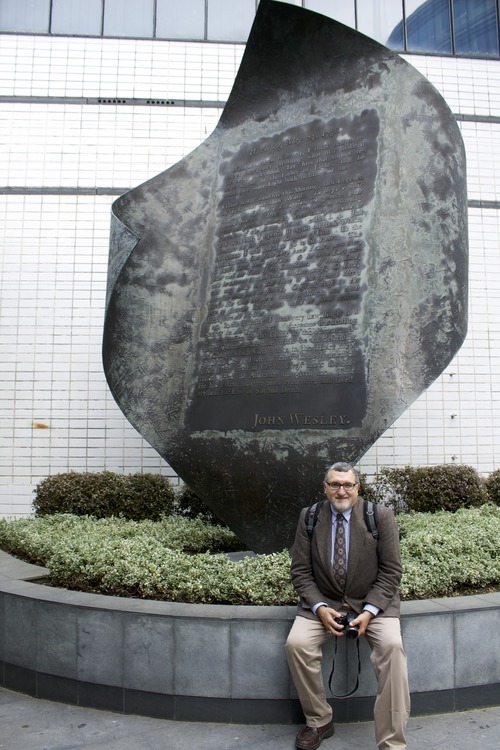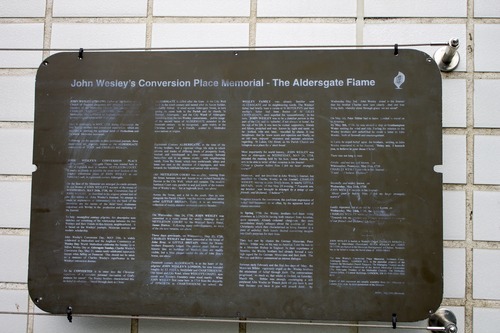Holy Club

Every week in our church staff meeting, one member of the staff gives a devotion to center the group. This week, it was my turn. Let me be honest… I had forgotten it was my turn, and in user error, my iPhone neglected to remind me until 8:55am before the 9:00am staff meeting. I quickly pulled out my iPad, pulled up my own personal morning devotion routine and ran into the staff meeting.
About ten years ago, I began working my way through the Queries included in Faith and Practice, the Quaker book of discipline. The questions are designed to bring accountability between the person answering, God and the larger faith family. It is an intentional, honest to evaluate one’s spiritual life. After working several years through the Queries, I came across, John Wesley’s “Holy Club” questions. The questions have their origin in the spiritual accountability group started by Wesley when he was a student at Oxford University — a group that detractors called “The Holy Club.”[1] The first list appeared about 1729 or 1730 in the preface to Wesley’s second Oxford Diary. Similar questions emerged in his 1733 A Collection of Forms of Prayer for Every Day in the Week. As late as 1781, Wesley published a list of questions like this in the Arminian Magazine.[2]
Having worked through these questions over and over, they became part of my weekly self-examination. I had a vision to please God with the way I lived my life, and to do so, I needed to be intentional about how I live and give an honest assessment to myself and to my accountability partner. As William Law would reason,
“It is because outward actions are necessary to support inward tempers; and therefore the outward act of joy is necessary to raise and support the inward joy of mind.”[3]
Becoming accountable to oneself and to others encourages the outside to match the inside, and vice versa, hence my love and affinity for the John Wesley and the Holy Club!
In a pinch, and because I do in fact serve at a Methodist church, I pulled out these questions, and one by one, I asked our staff to reflect and ponder the answers for their own lives. (I have included the list of 22 questions at the end of this post.) It was a meaningful moment, as we corporately examined our lives and prayed for each other as we sought to answer these hard, direct questions about ourselves. These questions are not intended to bring judgment on a person or belittle one’s way of living. On the contrary, it is meant to bring about a change in thinking, a lifestyle and culture change, to draw close to God in the midst of a small group of encouragers. As Hebrews 3:13 states, “Encourage one another daily, so that none of you may be hardened by sin’s deceitfulness.”
Last week in our cohort blogs and discussion, we mentioned over and again how if we do not learn the lessons of our past, we are destined to repeat the same mistakes. D. W. Bebbington’s classic Evangelicalism in Modern Britain is an attempt to highlight the key points in the history of the evangelical revolution in the Church, from the time of John Wesley to today. It is in John Wesley’s story, in his encouragement of answering tough questions about ourselves that we are to learn the mistakes of our own individual pasts and move forward with a new way of thinking and posture of life.
“There are four qualities that have been the special marks of the Evangelical religion: conversionism, the belief that lives need to be changed; activism, the expression of the gospel in effort; biblicism, a particular regard for the Bible; and what may be called crucicentrism, a stress on the sacrifice of Christ on the cross.”[4]
Methodists tend to flock toward three of these marks – conversionism, Biblicism, and crucicentrism.[5] That is seen vividly through Wesley’s thoughts in these questions for self-examination.
Lives need to be changed, and they will only change if we are intentional and focused on doing so. To close and quote Law again,
“This doctrine does not suppose that we have no need for divine grace, or that it is in our own power to make ourselves perfect. It only supposes, that through the want of a sincere intention of pleasing God in all our actions we fall into such irregularities of life as ny the ordinary means of grace we should have power to avoid; and that we have not the perfection, which our present state of grace makes us capable of, because we do not so much as intend to have it. It only teaches us that the reason why you see no real mortification or self-denial, no eminent charity, no profound humility, no heavenly affliction, no true contempt of the world, no Christian meekness, no sincere zeal, no eminent piety in the common lives of Christians, is this, because they do not so much as intend to be exact and exemplary in these virtues.”[6]
Reference:
Bebbington, D. W. Evangelicalism in Modern Britain. New York: Routledge, 1989.
Law, William, A Serious Call to a Devout Holy Life. New York: Cosimo, Inc., 2007.
***

John Wesley’s Holy Club Questions
- Am I consciously or unconsciously creating the impression that I am better than I really am? In other words, am I a hypocrite?
- Am I honest in all my acts and words, or do I exaggerate?
- Do I confidentially pass on to another what was told to me in confidence?
- Can I be trusted?
- Am I a slave to dress, friends, work, or habits?
- Am I self-conscious, self-pitying, or self-justifying?
- Did the Bible live in me today?
- Do I give it time to speak to me everyday?
- Am I enjoying prayer?
- When did I last speak to someone else about my faith?
- Do I pray about the money I spend?
- Do I get to bed on time and get up on time?
- Do I disobey God in anything?
- Do I insist upon doing something about which my conscience is uneasy?
- Am I defeated in any part of my life?
- Am I jealous, impure, critical, irritable, touchy, or distrustful?
- How do I spend my spare time?
- Am I proud?
- Do I thank God that I am not as other people, especially as the Pharisees who despised the publican?
- Is there anyone whom I fear, dislike, disown, criticize, hold a resentment toward or disregard? If so, what am I doing about it?
- Do I grumble or complain constantly?
- Is Christ real to me?
[1] This is also described by Bebbington as “a group nurturing the religious attainments of young men through guided reading, spiritual exercises and good works. Members bound themselves to self-examination, directed prayer, monthly communion, fasting and the quest for holiness.” D. W. Bebbington, Evangelicalism in Modern Britain (New York: Routledge, 1989), 36.
[2] “Wesley’s Self-Examination Quiz,” https://home.snu.edu/~hculbert/selfexam.htm.
[3] William Law, A Serious Call to a Devout Holy Life (New York: Cosimo, Inc., 2007), 195.
[4] Ibid., 2.
[5] Ibid., 35.
[6] Law, 19.
Leave a Reply
You must be logged in to post a comment.